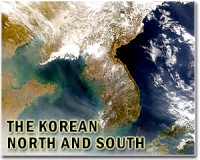 |
Seoul (AFP) Dec 22, 2010 South Korea, strengthened by public fury over a deadly North Korean attack, is pressing ahead with military drills to send an unambiguous signal that it will stand up to intimidation, analysts say. A new live-fire drill, scheduled for Thursday at Pocheon 20 kilometres (12 miles) south of the tense mainland border, will involve fighter jets, tanks, self-propelled guns and 800 soldiers. South Korea's navy meanwhile began a firing drill Wednesday off the east coast far south of the border. Tensions have soared since North Korean forces shelled Yeonpyeong island near the contested western sea border last month, in response to a live-fire drill there by the South. The bombardment, the first of a civilian area in the South since the 1950-53 Korean War, killed four people including civilians and damaged dozens of homes. Analysts said the latest drills were essential, especially in light of the military's perceived feeble response to the sinking of a warship in March -- for which Pyongyang denies responsibility -- and the Yeonpyeong attack. "If you relax and are not prepared and you try to be nice to the North Koreans, they will never stop," said Daniel Pinkston, Northeast Asia deputy project director at the International Crisis Group. "It's like a bully in the schoolyard: if you don't do anything they will never stop. Not to conduct military exercises would be irresponsible, ill-advised and counterproductive." More than 80 percent of South Koreans believe their military should have hit back harder after the Yeonpyeong shelling, according to a poll a week afterwards. Previously, "the strongest and most effective leverage which the North had against the South was public opinion in the South", a senior Seoul government official told reporters, citing pro-Pyongyang and leftist activists. Since the shelling, he said, opinion had shifted rapidly to the right -- making the North's bombardment both a military and a political mistake. The South staged a repeat of the Yeonpyeong drill on Monday but the North did not follow through with bloodcurdling threats to hit back, saying it "did not feel any need to retaliate against every despicable military provocation". The South deployed fighter planes and warships during the exercise, and Pinkston said "the credible use of the threat of force" was the main reason why the North did not retaliate. Also, he pointed out that 20 US servicemen were on the island at the time. Asked if there is a danger of the South being seen internationally as the bellicose party, as the North claims, Pinkston said Seoul had won the contest for international public opinion "hands down". Peter Beck, a North Korea expert with the Washington-based Council on Foreign Relations, noted that unlike Yeonpyeong, neither Pocheon nor the eastern waters where the naval drill was taking place are contested territory. "I don't think any reasonable person could see these exercises as provocative," he told AFP. While such exercises may not do much to deter Pyongyang, "they are a statement that the South won't back down in the face of the North's aggression", Beck said. "In light of this, it has no choice but to intensify its exercises." Asked why the North did not retaliate Monday, Beck said Beijing may have ordered its ally to exercise restraint until Chinese President Hu Jintao's visit to Washington next month. The South's military preparations may also have been a factor. "The North had lost the element of surprise and there was a recognition that this time the cost would be greater, although this by itself would not be enough to deter them." One analyst saw the upcoming drill as unnecessary. "Considering the current situation, these military exercises are not helpful for keeping peace and maintaining stability on the Korean peninsula," said Yang Moo-Jin of Seoul's University of North Korean Studies. But Lee Sang-Hyun of the South's Sejong Institute said that rather than backfiring, the drills would "send a strong message that South Korea will not tolerate North Korea's provocative acts any longer". "Many South Koreans are also angry and want their government to take a stern attitude over such provocations. South Korea also thinks the international community is on its side," Lee said.
Share This Article With Planet Earth
Related Links Learn about nuclear weapons doctrine and defense at SpaceWar.com Learn about missile defense at SpaceWar.com All about missiles at SpaceWar.com Learn about the Superpowers of the 21st Century at SpaceWar.com
 S.Korea to stage new live-fire drill near N.Korea border
S.Korea to stage new live-fire drill near N.Korea borderSeoul (AFP) Dec 22, 2010 South Korea's military said it would conduct a major ground and air live-fire exercise on Thursday near the North Korean border, as warships began a four-day exercise off the east coast Wednesday. Tensions remain high on the peninsula after the North threatened to hit back for a South Korean live-fire drill held Monday on an island near the disputed sea border off the west coast. It later an ... read more |
|
| The content herein, unless otherwise known to be public domain, are Copyright 1995-2010 - SpaceDaily. AFP and UPI Wire Stories are copyright Agence France-Presse and United Press International. ESA Portal Reports are copyright European Space Agency. All NASA sourced material is public domain. Additional copyrights may apply in whole or part to other bona fide parties. Advertising does not imply endorsement,agreement or approval of any opinions, statements or information provided by SpaceDaily on any Web page published or hosted by SpaceDaily. Privacy Statement |